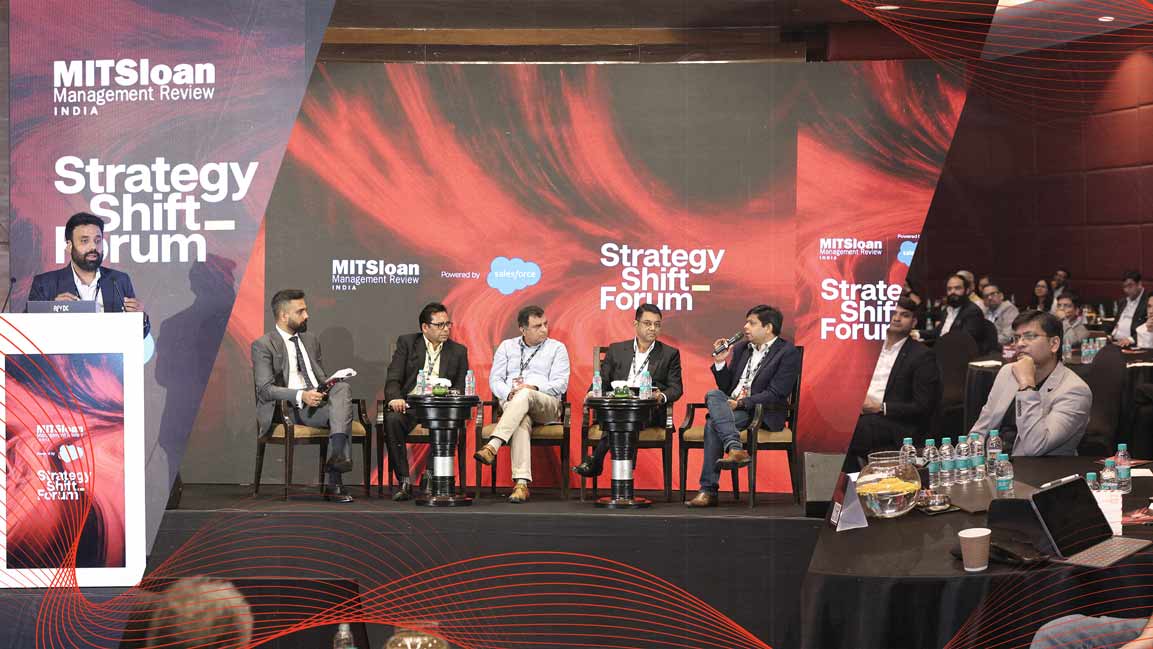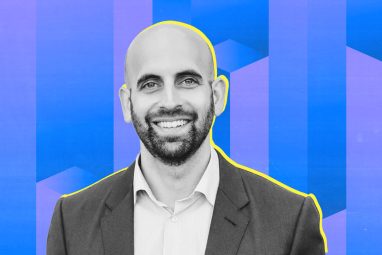At Strategy Shift Forum, Leaders Trade AI Hype for Real Outcomes
AI buzz gave way to hard discussions on scale and execution at the Delhi edition of the Strategy Shift Forum, hosted by MIT Sloan Management Review India and Salesforce.
Topics
News
- Skild AI Raises $1.4 Billion as Investors Chase General-Purpose Robotics
- Airbnb Taps Ex-Meta GenAI Chief Al-Dahle as CTO
- xAI Moves to Rein in Grok After Backlash Over Explicit Images
- OpenAI Turns to Cerebras as Real-Time AI Takes Priority
- Google Bets on Personalized AI at Scale by Linking Gmail, Photos, and Search
- Meta Shifts Resources From Metaverse Toward AI, Wearables

On Tuesday, August 19, India’s business and technology leaders gathered at the inaugural Delhi edition of the Strategy Shift Forum, organized by MIT Sloan Management Review India in partnership with Salesforce, in an effort to separate AI’s hype from its tangible impact.
The day opened with a welcome note by Ravi Raman, Publisher of MIT Sloan Management Review India, who framed the forum as a room for execution rather than commentary.
The first keynote, “The Age of Autonomous AI – Hype vs Reality,” delivered by MIT’s Neil Thompson, set the tone for the day as he explored the areas where autonomous systems are already delivering measurable returns, and where they remain limited by challenges such as poor data quality, compute constraints, and weak evaluation frameworks.
Thompson, who leads MIT’s FutureTech Research Project and is a Principal Investigator at the Institute on the Digital Economy, argued that autonomy in AI isn’t about removing humans from the loop entirely, but about systems that operate with minimal oversight—using tools, reasoning in steps, and learning from structured support.
Thompson cautioned against deploying AI too soon, noting that many systems fail because they aren’t robust to real-world variation.
“We talk about autonomous AI and agentic AI, but it’s actually been a continuum that we have been following for over a decade for the development of artificial intelligence,” he said. “The question is how close are we really to it and what does it mean to us?”
He highlighted the importance of aligning evaluation methods with the messy edge cases users actually encounter. Autonomy, he said, becomes truly valuable only when teams understand where it scales economically and when they build the data and governance structures that let it operate safely and repeatably.
A second plenary shifted to the front lines of customer operations. Salesforce leaders, joined by Rajesh K. Thanua, General Manager-Technology & InfoSec, SMAS Auto Leasing India Pvt. Ltd, showed how humans working alongside software agents are redesigning key processes in service, sales, and onboarding.
They showcased Salesforce’s Agentforce framework, where autonomous yet governed agents operate on unified customer data to accelerate KYC checks, improve fraud detection, and raise first-contact resolution rates.
The message was pragmatic: teams that combine strong guardrails with agentic automation are moving faster without sacrificing oversight.
More than 250 delegates attended the forum, that later split into three concurrent tracks aimed at converting big ideas into operating playbooks.
The Intelligent Experience track examined how loyalty is being reshaped when every customer touchpoint becomes intelligent.
A panel featuring Ashish Tiwari of Home Credit India, Chander Shekhar of Salesforce, Dilpreet Singh of ITC Hotels, and Satyam Mehra of Tata Digital discussed how real-time signals across channels are being stitched together to power decisions that feel timely and personal without being intrusive.
The session emphasized building on first-party data, consent-by-design architectures, and a shift from campaign calendars to moment-based orchestration.
A 90-minute masterclass by behavioral scientist and author Patrick Fagan followed.
Fagan said that everyday interactions reveal subtle psychological cues—from color preferences to reaction times—that can inform better design, messaging, and product decisions.
He urged teams to pair these behavioral signals with experimentation discipline, noting that even small changes can lift conversion and engagement if grounded in insight rather than assumption.
The AI Innovation track focused on the underlying infrastructure required to operationalize intelligence.
Harvansh Singh Sagar of Axis Max Life Insurance, Neeraj Gera of upGrad, Romil Agarwal of Salesforce, and Saurabh Tiwari of Policybazaar discussed how their organizations are unifying data into a single decision layer that lets AI models act instantly inside CRMs, operations platforms, and underwriting tools.
The panel shared lessons on designing data contracts, deploying feature stores, and using human-in-the-loop mechanisms to maintain quality.
Thompson returned for a second session, a masterclass on “The Logic of Scale,” where he broke down the economic rationale behind AI adoption.
He showed how automation only makes sense when it scales better than labor, and how to price latency and accuracy trade-offs in real deployment.
“Neil Thompson spelled out the trade-offs for AI, GenAI, and LLMs—investment, sustainability, emissions, accuracy training, and the choice between LLMs and classical or quant approaches. That perspective was missing from my armour,” Kunal Goyal, who leads digital transformation at Pernod Ricard India, said on the sidelines of the forum.
The Commercial Growth track took on a sharper business lens.
Deepak Pargaonkar of Salesforce, Shamik Banerjee of Apollo 24|7, and Varun Das of Airtel Digital asked a hard question: are teams chasing more deals, or closing them smarter?
They unpacked how predictive insight, embedded into daily systems, sharpens forecasts and streamlines pipeline health.
The panelists shared how removing friction in decision-making—not just in customer journeys but in internal sales processes—creates more repeatable wins.
Capt. Raghu Raman, leadership expert and founding CEO of India’s National Intelligence Grid, or NATGRID, led a closing session on decision-making in high-stakes environments.
He outlined four behaviors that are killing organizations: not learning from the past, not acting in the present, not preparing for the future, and not taking responsibility.
Drawing on his experience in both the armed forces and corporate leadership, he called for clarity under pressure, trust in distributed teams, and disciplined after-action reviews.
“Decisions under uncertainty must be trained for,” he said, noting that reactive cultures miss long-term signals.
On the sidelines between sessions, Riti Nigam, Vice President of Operations at Silver Arrows Mercedes-Benz, said: “Strategy is about letting go of options. With AI now being integrated into processes, the real challenge is finding the right balance between human judgment and AI — and that’s what we look forward to.”
“The human drive to connect, to solve problems, and to stay curious is not going anywhere. Over the next 20 years, the challenges we face will grow more complex, more multidisciplinary, and tougher to solve. In that context, human traits like connection, trust, curiosity, and empathy will matter even more. AGI may arrive, but we expect it to remain under human supervision,” Gera of upGrad said.
The forum also introduced design touches to keep the focus on action.
Delegates filled out a “Future-You” postcard with one outcome they aim to achieve by 2026—a note the organizers plan to mail back in six months as a self-check on progress.
An AI photobooth and “photomagazine” station turned the foyer into a networking hub, while certificates of participation were issued at the registration desk before close.
The Strategy Shift Forum now moves to Conrad Bengaluru on September 25. Click here for more details.




